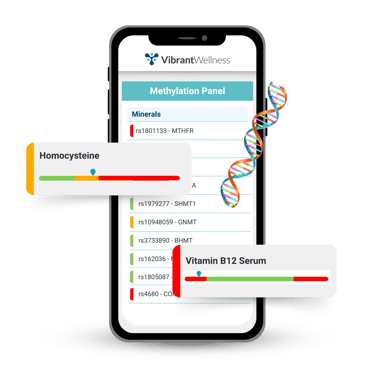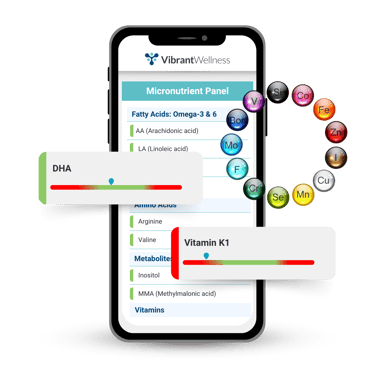Metabolic health is the foundation of nearly every system in the body—from how we generate energy to how we respond to stress, manage inflammation, and protect the heart. Yet, in today’s fast-paced world, our metabolic systems are under more stress than ever. Poor diet, chronic stress, environmental toxins, and genetic variations can all interfere with the body's efficient functioning—and more importantly, its ability to absorb and utilize the necessary nutrients for optimal health and well-being.
In this blog, we’ll explore how metabolic dysfunction and chronic stress rob the body of key nutrients, why this matters for heart health, and how functional nutrition testing can uncover hidden imbalances. We will also discuss which micronutrients are most critical for supporting metabolism, how genetics can influence nutrient needs, and why personalized nutrition testing is essential for preventing chronic diseases and optimizing long-term health.
Table of Contents
What Is Metabolic Dysfunction?
Metabolic dysfunction is often referred to as metabolic syndrome—a group of conditions that raises the risk for developing cardiovascular disease, type 2 diabetes, and stroke. When left untreated, metabolic syndrome can lead to atherosclerosis, a condition characterized by plaque buildup in the arteries.
A person diagnosed with metabolic syndrome must meet at least three out of these five criteria:
- Excess abdominal weight
- High triglycerides
- Low HDL cholesterol
- Elevated blood sugar
- High blood pressure
Many complex factors contribute to the development of metabolic syndrome, but most evidence suggests that insulin resistance is the primary driver. Lifestyle factors may contribute to the development of insulin resistance, including a lack of physical activity, being overweight or obese, certain medications, and genetics.

How Metabolic Dysfunction & Stress Deplete Key Nutrients
Now that you understand what metabolic dysfunction is, let's explore how it can affect your health.
Metabolic Overload & Inflammation
Every physiological or biochemical process in the body—such as detoxification, cellular respiration, hormone production, digestion, and immune function—requires vitamins and minerals as cofactors. Metabolic pathways may become overloaded when the body is dealing with ongoing inflammation.
An adequate intake of micronutrients is crucial to supporting a healthy metabolism and other physiological processes. For example, methylation, a process critical for heart health and detoxification, relies heavily on folate and Vitamins B6 and B12. Without adequate nutrients, methylation slows down, resulting in elevated homocysteine levels, which are associated with increased cardiovascular risk.
Metabolic pathway testing may be useful in assessing levels of vitamins, minerals, and antioxidants necessary for metabolic function. The Methylation Panel from Vibrant Wellness evaluates key genetic and biochemical markers involved in methylation pathways, including folate metabolism, detoxification, and DNA repair. The insights from this test can help guide you to make personalized nutrition and lifestyle recommendations for patients and help them reduce the risk of chronic diseases and improve their metabolic health.
Chronic Stress: The Nutrient Thief
A common yet often overlooked factor in metabolic nutrient depletion is stress. When a person is under stress, the body utilizes vitamins and minerals, such as magnesium, zinc, iron, Vitamin C, and B vitamins, at a faster rate. These micronutrients are essential for regulating the nervous system and supporting energy production and immune function. Chronic stress can leave your patients in a nutrient deficit, impairing their ability to recover and increasing their risk of developing conditions related to heart disease, such as high blood pressure and chronic inflammation.

Why This Matters for Heart Health
The human heart is one of the most metabolically active organs in the body. It requires a constant supply of vitamins, minerals, and antioxidants to generate energy, maintain electrical rhythm, and manage oxidative stress. Deficiencies in micronutrients can impair the heart’s ability to recover from damage. Studies have shown that patients with heart failure are frequently deficient in certain micronutrients such as iron, zinc, copper, and selenium.
This is where functional nutrition testing becomes so important. Identifying hidden nutrient depletions allows for targeted replenishment, supporting metabolism, reducing cardiovascular risk, and improving overall health.
Key Micronutrients for Cardiovascular Function
The heart works around the clock to circulate blood, oxygen, and nutrients. To keep it running efficiently, the body relies on a steady supply of vitamins, minerals, and antioxidants. Even a subtle vitamin and mineral deficiency may compromise cardiovascular function over time.
B Vitamins: Methylation Support & Homocysteine Clearance
Methylation is defined as a chemical reaction in the body in which a small molecule called a methyl group gets added to DNA, proteins, or other molecules. The addition of methyl groups can affect how some molecules act in the body. In simpler terms, methylation is similar to a “switch” that can turn certain genes on or off, affecting how genes are expressed in the body.
One of methylation’s key roles is keeping homocysteine levels in check. Elevated homocysteine is a known risk factor for heart disease, linked to arterial damage and blood clot formation. Low intake or poor absorption of B vitamins (especially in those with MTHFR or related genetic variants) can impair this process, allowing homocysteine to build up and silently increase cardiovascular risk.
Magnesium: Crucial for Heart Health
Magnesium supports over 300 enzymatic reactions in the body, including protein synthesis, muscle contraction, blood vessel relaxation, energy metabolism, and immune system function. A magnesium deficiency is linked to poor health outcomes and chronic disease.
Magnesium is often depleted by chronic stress, poor sleep, and medications. According to observational data, there may be a link between low serum magnesium levels and increased atherosclerosis, coronary artery disease, arrhythmias, and heart failure.
Antioxidants: Defense Against Oxidative Stress
Oxidative stress plays a major role in the development of atherosclerosis. Antioxidants like vitamin C, vitamin E, selenium, and glutathione help neutralize free radicals and protect blood vessels from damage. Without adequate antioxidant support, oxidative stress can accelerate inflammation, leading to tissue damage.
CoQ10: Mitochondrial Energy for the Heart
Cardiac muscle is rich in mitochondria and has a high energy demand compared to other organs. Coenzyme Q10 (CoQ10) is an important antioxidant and crucial for generating ATP, the primary energy-carrying molecule in cells. CoQ10 is often depleted in individuals taking statins or those under chronic metabolic stress. Supplementing them can improve energy levels, reduce fatigue, and support overall cardiac muscle efficiency.

Genetics and Nutrient Demand: The Role of SNPs
While lifestyle stressors and metabolic dysfunction play a big role in nutrient depletion, genes also influence how well the body uses and recycles essential vitamins and minerals.
SNPs: Small Genetic Variations, Big Nutrient Impact
SNPs (pronounced “snips”)—short for single-nucleotide polymorphisms—are the most common type of genetic variation. Some SNPs help predict how a person might react to certain drugs, environmental toxins, or the risk of developing certain diseases. These inherited changes may slow down or impair enzyme function in key metabolic pathways.
Key Genes That Influence Heart-Related Nutrient Needs
- MTHFR (Methylenetetrahydrofolate Reductase): This gene helps convert folate from food into its active form, methylfolate. A patient with an MTHFR variant may struggle to convert homocysteine to methionine, leading to elevated homocysteine levels in the blood. Supplementation with folate, B6, and B12 in bioavailable forms may help support proper methylation.
- COMT (Catechol-O-Methyltransferase): Affects how neurotransmitters like norepinephrine and dopamine are metabolized. A slower COMT enzyme may increase the body’s demand for magnesium and B vitamins.
- BHMT (Betaine-Homocysteine Methyltransferase): Also plays a role in methylation and homocysteine balance. Variants can result in higher demand for choline, betaine, zinc, and vitamin B6.
When these genes are less efficient, the need for specific nutrients goes up, especially B vitamins, magnesium, zinc, choline, and antioxidants. Without adequate levels, the cardiovascular system may be more vulnerable to inflammation, oxidative damage, and impaired nutrient metabolism.
The Power of Personalized Nutrition Testing
We can’t change our genes, but we can support them. Functional nutrition testing, like the NutriPro Panel and Methylation Panel from Vibrant Health, helps uncover SNPs and shows where you may need more targeted nutrition for your patients. When combined with a micronutrient panel to measure current nutrient status, you get a clear roadmap for optimizing heart health at the root level.


Why You Need to Test Both: Nutrients + Genes
When it comes to supporting cardiovascular health, guesswork isn’t enough. Two people can eat the same diet, take the same supplements, and live similar lifestyles—yet experience drastically different outcomes. That’s because nutrition is not one-size-fits-all. The true power lies in personalized nutrition testing, which reveals both current nutrient status and your patient’s genetic capacity to utilize those nutrients.
- The Micronutrient Panel measures intracellular and extracellular nutrient levels to help detect deficiencies before they cause health issues.
- The NutriPro Panel and Methylation Panel assess a patient’s genetic blueprint. They identify SNPs that affect how efficiently the body absorbs, converts, and uses key nutrients, especially B vitamins, magnesium, choline, and antioxidants.
Key Takeaways
- Chronic stress and inflammation accelerate the depletion of essential nutrients like magnesium, zinc, B vitamins, vitamin C, and antioxidants, which are critical for metabolic and cardiovascular health.
- Micronutrients are the fuel for metabolic pathways. Without adequate levels, key processes like methylation, detoxification, and energy production become impaired, increasing disease risk.
- Genetic variations (SNPs) in genes like MTHFR, COMT, and BHMT can impact how well the body uses certain nutrients, increasing individual needs for B vitamins, magnesium, choline, and other cofactors.
- Functional nutrition testing, including micronutrient panels and genetic assessments, can uncover both current nutrient deficiencies and inherited factors that affect nutrient utilization.
- Testing removes the guesswork. By identifying where nutrient depletion is happening and why, you can create more targeted, effective nutrition strategies to support cardiovascular and metabolic health.

About the Author
Leslie Weidner is a dedicated and passionate registered dietitian nutritionist with over a decade of experience in nutrition and dietetics. As the founder of Leslie Weidner Nutrition, a virtual nutrition coaching business, she specializes in guiding women through the complex journey of perimenopause, helping them navigate hormonal changes with personalized nutrition plans and lifestyle adjustments. Over the past five years, Leslie has empowered dozens of women to make sustainable, healthy habit changes.
Regulatory Statement:
The information presented in case studies have been de-identified in accordance with the HIPAA Privacy protection.
The general wellness test intended uses relate to sustaining or offering general improvement to functions associated with a general state of health while making reference to diseases or conditions. This test has been laboratory developed and its performance characteristics determined by Vibrant America LLC and Vibrant Genomics, a CLIA-certified and CAP-accredited laboratory performing the test. The lab tests referenced have not been cleared or approved by the U.S. Food and Drug Administration (FDA). Although FDA does not currently clear or approve laboratory-developed tests in the U.S., certification of the laboratory is required under CLIA to ensure the quality and validity of the test.











